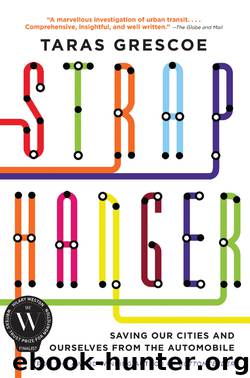Straphanger by Taras Grescoe

Author:Taras Grescoe [Grescoe, Taras]
Language: eng
Format: epub
ISBN: 9781443411431
Publisher: HarperCollins Canada
Published: 2012-02-28T16:00:00+00:00
Terror Underground
It’s something you notice right away. Not only do Muscovites like their Metro; they are actually proud of it. Even bombs won’t stop them from using it.
On March 29, 2010, at the height of the morning rush hour, a bomb went off as commuters were leaving a crowded train at Lubyanka station, killing twenty-six; forty minutes later, a blast at the Park Kultury station killed fourteen more and injured dozens. Caught on security cameras, the culprits, whom the media dubbed “Black Widows,” turned out to be female Islamist separatists from the Caucasus who had detonated explosive belts as they stepped onto the platforms.
The slaughter and ensuing panic—each bomb was packed with bolts and screws and the equivalent of three pounds of dynamite, and provoked stampedes in which dozens were trampled—would have been enough to completely paralyze any other metropolis. But even after the second bomb went off, the Metro’s managers refused to shut down the system; to do so, they confessed, would have meant chaos in the streets of Moscow. As it was, rush hour traffic on the streets was so impenetrable that ambulances couldn’t reach the bomb sites; the wounded had to be helicoptered to hospitals.
Visiting Moscow two months after the blasts, I feared I would find the system deserted, or used only by gray-faced wraiths with their heads down. But in the vast central halls, which are cool when the city above swelters in summer heat, and warm and bright when the streets are slushy and dark, people waited for friends, texted on cell phones, and generally treated the Metro like the most welcoming of public spaces. A plastic-wrapped red rose, left on the floor in the Zal of the Lubyanka station, was the only reminder of the bombings. Intrigued by this apparent indifference to danger, I asked some Muscovites if the bombings had changed their attitude to riding the Metro.
Just outside Lubyanka station, where the first bomb had gone off, a woman in her early sixties, dressed in faded jeans, sandals, and a blazer made of roughly sewn leather patches, was removing a stack of pamphlets from her purse. Behind her loomed the intimidating mustard-yellow facade of the former KGB headquarters, now the head office of the Federal Security Service.
Her name was Valentina Pavlova; she said she had been riding the Metro since she was a child. She now lived on Moscow’s northern outskirts near Sergiyev Posad, one of Russia’s greatest monasteries. Every weekday, she rode a commuter train to Komsomolskaya Square; there she transferred to the Metro. The trip took about an hour and a half.
“I have an aunt who lives in the center of Moscow, she’s eighty-four,” Pavlova explained. “There’s nobody to watch her, so I take care of her. That’s the way we’ll all be one day—you can’t always be young.”
To supplement her pension, Pavlova handed out flyers to passersby. When the bomb went off at Lubyanka, she was already out on the street working. “Within ten minutes, everybody knew something bad had happened,” she said.
Download
This site does not store any files on its server. We only index and link to content provided by other sites. Please contact the content providers to delete copyright contents if any and email us, we'll remove relevant links or contents immediately.
The Secret History by Donna Tartt(16623)
The Social Justice Warrior Handbook by Lisa De Pasquale(11489)
Thirteen Reasons Why by Jay Asher(7788)
This Is How You Lose Her by Junot Diaz(5771)
Weapons of Math Destruction by Cathy O'Neil(5036)
Zero to One by Peter Thiel(4824)
The Myth of the Strong Leader by Archie Brown(4789)
Promise Me, Dad by Joe Biden(4447)
Beartown by Fredrik Backman(4417)
Stone's Rules by Roger Stone(4415)
How Democracies Die by Steven Levitsky & Daniel Ziblatt(4398)
The Fire Next Time by James Baldwin(4342)
100 Deadly Skills by Clint Emerson(4076)
A Higher Loyalty: Truth, Lies, and Leadership by James Comey(4032)
Rise and Kill First by Ronen Bergman(4012)
The David Icke Guide to the Global Conspiracy (and how to end it) by David Icke(3881)
The Farm by Tom Rob Smith(3872)
Secrecy World by Jake Bernstein(3782)
The Doomsday Machine by Daniel Ellsberg(3730)
